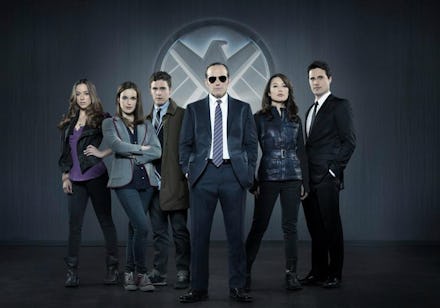'Agents of S.H.I.E.L.D.' Would Be an Amazing Show, If It Could Just Solve This One Problem

In the midst of an already-stuffed lineup of superhero media, Marvel is trying to put a spin on the usual formula with Joss Whedon's Agents of S.H.I.E.L.D. series. The show's protagonists are notably cape-free; instead of heroes, they're observers, normal humans — albeit with some serious espionage training — living in a comic book world. But so far, this new spin has proven tough for the show to handle, as its Marvel heritage has only gotten in the way of its potential to be a high quality TV show. Agents of S.H.I.E.L.D. can't decide whether to be a good drama or a good comic book show, and, as a result, it fails to be either.
The October 22 episode, "Girl in the Flower Dress," was certainly not at a loss for comic-book action. Agent Coulson and his team were whisked away to Hong Kong to take on a normal citizen-turned-supervillain named Scorch, a man mysteriously endowed with the ability to shoot fire out of his hands. The fire looked unarguably awesome, but the whole encounter felt a bit hollow, perhaps because the episode revealed the show's basic formula — man gets endowed with superpowers, becomes manipulated by shadowy organization, then goes berserk. This was an identical plot to the show's pilot. Plenty of good comic shows, like the CW's Arrow, use this "villain of the week" structure, but it can only work when the villains are actually unique and not just excuses for cool action scenes.
The show could work despite this fault if it focused on developing its human protagonists, but even they can be summarized in a few bullet points. Skye is the spunky hacker with a sensitive side; Ward, the loner with poor social skills; May, the weary veteran; and those British scientists are sheer comic relief. There have been moments of character development, for sure — the Skye-Ward flirtation is certainly engaging — but while they hint that the show is trying to be something more dramatically complex than the average superhero fare, they end up only drawing attention to their characters' shallowness.
The only really interesting character on the show is Coulson, partly because Clark Gregg is one of the S.H.I.E.L.D. cast's only subtle actors, but also because the character has a much more extensive back story than the others. Coulson is also the only element that really makes S.H.I.E.L.D. feel like a Marvel show, and his presence as the center point adds new layers to what we've already seen of him in the related Marvel movies. That is how a good comic book show should function: it should incorporate elements from the source material faithfully and develop them naturally, with some eye-popping action thrown in the mix as well.
Courtesy ABC.
While Coulson fits this mold well, all of the show's other comic book references have been so fleeting that they're just plain distracting. Cobie Smulders' Maria Hill and Samuel L. Jackson's Nick Fury have made frustratingly pointless cameos while Iron Man 3's Extremis formula has popped up with little to no explanation. S.H.I.E.L.D. can't be a good comic book show unless it develops threads like these into more than mere Easter eggs that remind you that the show is theoretically part of a much more fully-realized universe.
In the show's best episode so far, "Eye Spy," superpowers and comics references were notably absent. Instead, that episode offered tightly paced, slightly larger-than-life action, and it actually had the time to let its characters grow a bit as well. That was Agents of S.H.I.E.L.D. as a good show. It can be a good comic book show, too, but unlike other such programs, like Arrow and Smallville, S.H.I.E.L.D.'s super-powered elements aren't built into its fabric. If S.H.I.E.L.D. wants to be integral to the Marvel lineup, those pieces have to feel as central as the human ones.
Or it can let them go and just be good TV.